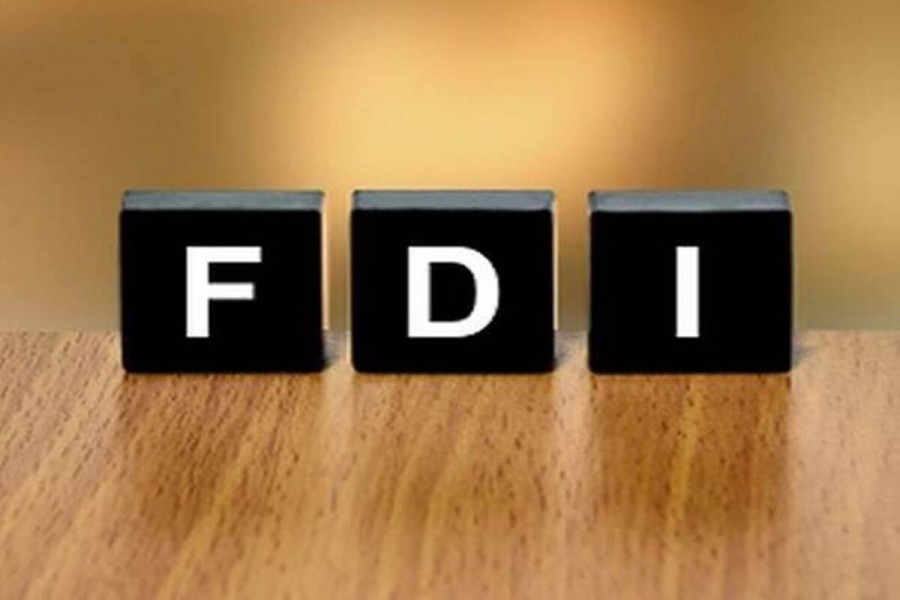
Published :
Updated :

India attracted foreign direct investment (FDI) inflows of $22.53 billion during the first three months of the fiscal year starting on April 1, about 90 per cent higher than the April-June period last year, the government has said.
India’s automobile industry accounted for 27 per cent of the total FDI equity inflow, emerging as the brightest sector in Asia’s third-largest economy, followed by computer software and hardware and the services sectors which accounted for 17 per cent and 11 per cent of the inflows respectively, the trade ministry said in a statement on Saturday, reports Reuters.
“Measures taken by the Government on the fronts of FDI policy reforms, investment facilitation and ease of doing business have resulted in increased FDI inflows into the country,” the statement added.
Indian Prime Minister Narendra Modi’s administration has cut corporate tax rates to woo manufacturers and revive private investment, introduced new farm laws and passed labour reforms aimed at making hiring and firing workers easier.
Foreign portfolio investors (FPI) have made a net investment of Rs 50.01 billion so far in August in Indian equities, according to data from NSDL.
The FPIs have made a comeback after a net outflow of Rs 113.08 billion in July. With the investments in August, the net FPI investment in the equities segment in 2021 now stands at Rs 540.37 billion.
Shrikant Chouhan, Executive Vice President, Equity Technical Research at Kotak Securities said: “FPIs have been net buyers in Indian equities in Aug 2021 till date. FPI flows are expected to be volatile, given FOMC meeting minutes suggesting increased tapering likelihood.”
“Tapering is expected to have a substantial impact on global equity markets,” he said.
The Indian government announced recently that India to monetise Rs 6 trillion ($81 billion) worth of state assets over the next four years under a plan announced earlier in the 2021/2022 budget to boost infrastructure spending and spur economic growth in Asia’s third biggest economy.
The government aims to hand already built assets such as gas pipelines, roads, railway stations and warehousing facilities among others over to the private sector to operate on a long-term lease, Amitabh Kant, chief executive of government think tank NITI Aayog, told a news conference.
“The strategic objective of the programme is to unlock the value of investments in brownfield public sector assets by tapping institutional and long-term patient capital which can thereafter be leveraged for further public investments.”
India’s foreign exchange reserves fell by $2.470 billion, during the week ended August 20.
According to the Reserve Bank of India’s (RBI) weekly statistical supplement, the reserves decreased to $616.895 billion from $619.365 billion reported for the week ended August 13.
India’s forex reserves comprise foreign currency assets (FCAs), gold reserves, special drawing rights (SDRs), and the country’s reserve position with the International Monetary Fund (IMF).
On a weekly basis, FCAs, the largest component of the forex reserves, edged lower by $3.365 billion to $573.009 billion.
However, the value of the country’s gold reserves rose by $913 million to $37.249 billion. On the other hand, the SDR value slipped by $3 million to $1.541 billion. In addition, the country’s reserve position with the IMF decreased by $15 million to $5.096 billion.
Separately, Indian shares were largely unchanged in choppy trading on Friday, with banking stocks dropping as investors eyed Federal Reserve Chair Jerome Powell’s speech to get clues on the central bank’s timeline to taper its asset purchase programme.
Future files new case against Amazon: India’s Future Retail on Saturday filed a new case against Amazon.com at the Supreme Court in its latest effort to seek clearance for its $3.4 billion retail assets sale, which the US firm has challenged.
The Supreme Court this month dealt a blow to Future when it said an interim decision by a Singapore arbitrator in October 2020 that put its deal with Reliance Industries on hold - following Amazon’s complaint - was valid in India.
The top court had also said Future could not appeal a lower court’s decision against it. The retailer is now asking the top court to hear the challenge, people familiar with the case said.
In its over 6,000-page filing, Future has argued that if the deal with Reliance doesn’t go through, it would cause “unimaginable” damage to the group, including possible job losses for 35,575 employees, and put at risk roughly 280 billion rupees ($3.81 billion) in bank loans and debentures.
“There is extreme urgency to hear this petition,” Future counsel Yugandhara Pawar Jha said in the Supreme Court filing, which is not public. Reuters has seen the filing.
Amazon and Future spokespersons did not respond to requests for comment on Saturday.
Amazon has for months been locked in a dispute with Future, and accuses the Indian firm of violating contracts when it sold its retail assets to market leader Reliance last year. Future denies any wrongdoing.
The outcome of the tussle involving two of the world’s richest men, Amazon’s Jeff Bezos and Reliance’s Mukesh Ambani, is seen as reshaping India’s pandemic-hit shopping sector and deciding whether Amazon can blunt Reliance’s dominance of the country’s nearly trillion-dollar retail market.


 For all latest news, follow The Financial Express Google News channel.
For all latest news, follow The Financial Express Google News channel.